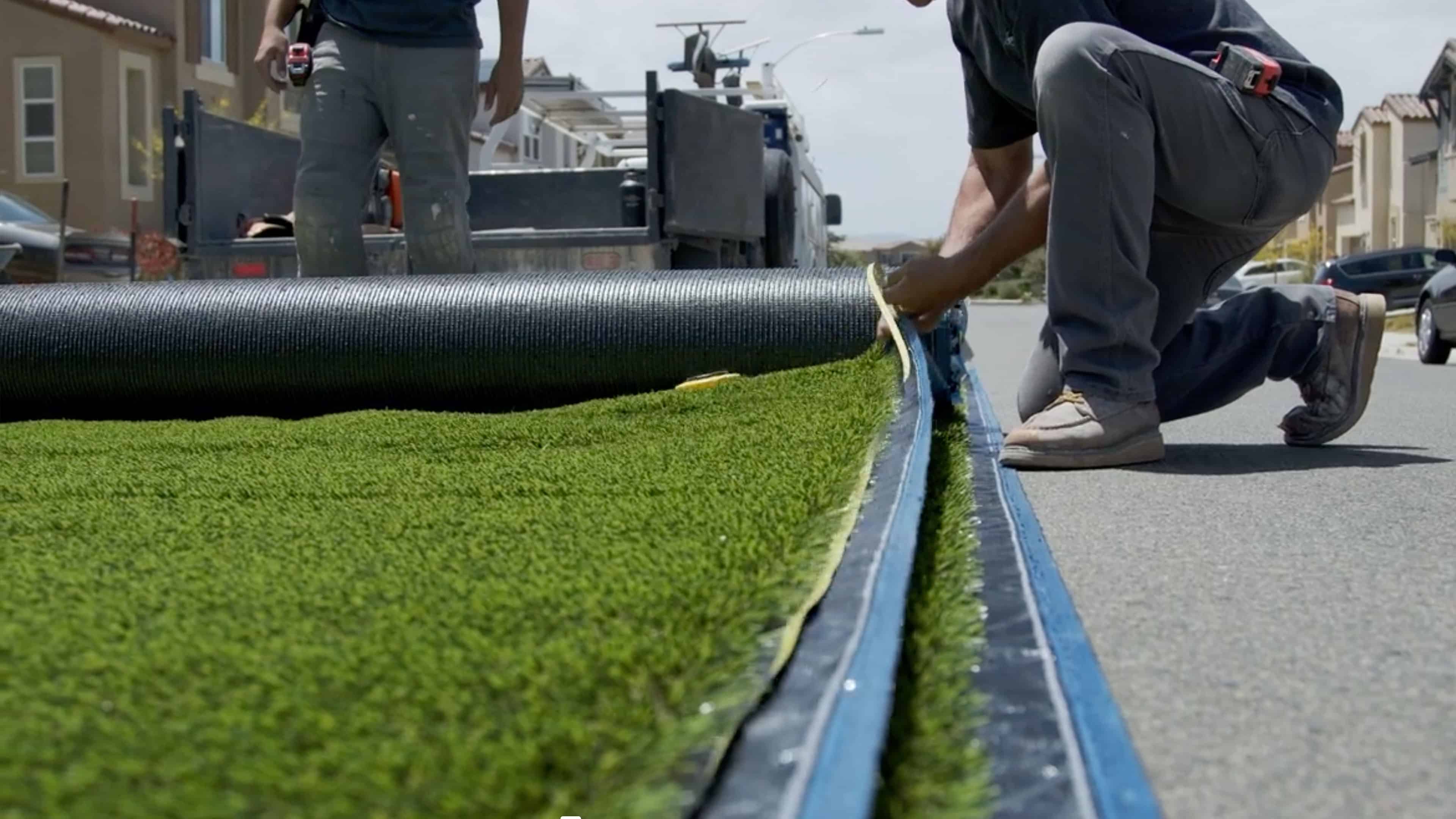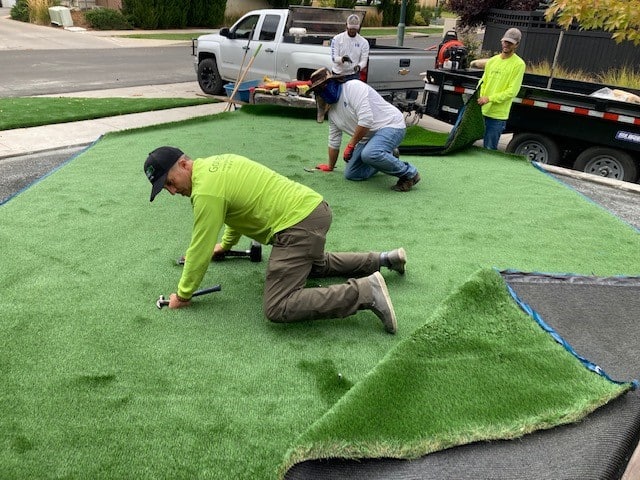Leading Factors to Take Into Consideration Artificial Yard for a Low-Maintenance and lush Lawn
As home owners progressively look for sustainable services for exterior rooms, fabricated grass provides an attractive alternative to standard lawns. The advantages expand beyond simple aesthetic appeals and sustainability; exploring the diverse effects of fabricated lawn discloses a thorough strategy to yard management that values much deeper factor to consider.
Year-Round Greenery
Among one of the most considerable benefits of fabricated turf is its capability to offer year-round plant, no matter of environment problems. Homeowners frequently face obstacles in preserving a vivid lawn due to seasonal modifications, droughts, or hefty rainfall. Artificial lawn gets rid of these worries, making certain a regularly lavish appearance throughout the year.
This artificial choice is engineered to hold up against different climate situations, from burning summer warmth to freezing winter temperatures. Unlike all-natural lawn, which might brownish or come to be patchy throughout extreme problems, synthetic grass maintains its vibrant shade and texture, boosting the visual charm of any landscape.
In addition, artificial turf is resistant to pests and illness that generally impact natural yards. This strength adds to its long-lasting beauty, as there is no need for chemical therapies or plant foods that can be unsafe to the atmosphere. Additionally, homeowners can take pleasure in the visual benefits of a well-kept yard without the cyclical obstacles positioned by all-natural lawn treatment (artificial grass installation).
Lowered Upkeep Efforts
Man-made lawn substantially lowers upkeep initiatives, enabling homeowners to appreciate a pristine lawn without the lengthy jobs related to all-natural grass care. Among one of the most remarkable advantages of artificial turf is the removal of regular mowing. Without demand for a lawnmower, home owners save both time and the expense of maintenance linked with this tools.

Cleansing fabricated turf is uncomplicated; a basic rinse with a tube or the occasional brushing to get rid of particles is typically enough - artificial grass. This ease of care enables property owners to spend more time enjoying their outside areas instead of struggling over them. In recap, the reduced upkeep initiatives connected with man-made yard make it an attractive choice for those looking for a lovely, problem-free backyard
Water Conservation Advantages
The considerable decrease in maintenance efforts associated with artificial lawn encompasses water conservation, making it an eco-friendly option for home owners. Traditional lawns require substantial amounts of water to remain lively and lavish, commonly causing extreme water usage, specifically in deserts. On the other hand, synthetic turf removes the requirement for normal watering, significantly lowering the total water consumption in your lawn.
By going with synthetic lawn, homeowners can conserve countless gallons of water each year. This change not just benefits individual homes but also adds to more comprehensive ecological efforts targeted at lowering water waste. In locations experiencing water shortage, the fostering of fabricated grass can play a considerable function in mitigating the impacts of dry spell and guaranteeing that useful water sources are utilized much more effectively.
In addition, the installation of synthetic yard can aid reduced municipal water demand, profiting the neighborhood in its entirety. With expanding understanding of environmental concerns, picking man-made grass acts as an aggressive step towards sustainable landscaping, assisting to preserve all-natural water sources while maintaining a cosmetically pleasing outdoor room (artificial grass). In summary, artificial yard offers a compelling solution for water conservation, straightening environmental responsibility with modern landscape design needs

Parasite and Allergy Decrease
A substantial benefit of installing synthetic grass is its ability to lower insects and irritants in exterior spaces. Conventional yard yards often work as reproducing grounds for insects such as mosquitoes, ticks, and ants, which can develop discomfort and health and wellness threats for pets and family members. On the other hand, fabricated grass eliminates the organic material that brings in these bugs, therefore substantially reducing their populations in your yard.
Furthermore, natural yard can harbor mold, plant pollen, and various other allergens, which can cause allergic reactions and respiratory concerns for delicate individuals. Artificial turf offers a cleaner environment, reducing the potential for allergenic responses. Unlike natural grass, synthetic lawn does not create pollen, making it an outstanding option for allergy victims looking for to enjoy their outside rooms without the threat of flare-ups.
Furthermore, the lack of soil in synthetic grass implies there is much less dust and dirt, more reducing air-borne allergens. This low-maintenance option not just enhances the visual appeal of your backyard yet likewise advertises a healthier outdoor environment, permitting families to appreciate their yards without the constant worry of parasites and allergens. Therefore, man-made grass is a critical selection for those prioritizing convenience and health in their exterior living areas.
Long-Term Expense Savings
Spending in synthetic turf can lead to substantial long-term Visit Your URL cost financial savings for house owners. Man-made grass eliminates the demand for normal lawn upkeep expenses, such as mowing, fertilizing, and watering.
Furthermore, the durability of synthetic lawn even more improves its cost-effectiveness. The majority of premium man-made grass products can last 15 to 25 years with minimal maintenance, reducing the need for replacement or considerable repairs. In comparison, natural lawn might need constant reseeding and regular treatment, which can swiftly accumulate in expenses.
Energy cost savings are another crucial element. Property owners can expect to see reduced water bills, as synthetic turf does not require irrigation. In addition, the reduction in lawn care services can maximize important time and resources, allowing homeowners to allot their spending plans somewhere else.
Conclusion
In recap, man-made turf provides countless benefits for property owners seeking a low-maintenance and dynamic landscape. Its capability to provide year-round greenery, combined with lowered upkeep efforts and substantial water preservation, makes it an attractive selection. Additionally, the decrease of irritants and bugs contributes to a much healthier outdoor environment. Inevitably, the long-lasting price financial savings related to artificial grass strengthen its standing as a sustainable and useful option for enhancing outdoor rooms.
Fabricated yard significantly lowers maintenance efforts, allowing house owners to appreciate a beautiful yard without the time-consuming jobs associated with natural lawn treatment.The significant reduction in maintenance initiatives linked with synthetic lawn extends to water preservation, making it an environmentally friendly choice for house owners. In comparison, fabricated turf removes the demand for routine watering, considerably reducing the total water intake in your yard.
In areas Discover More experiencing water shortage, the fostering of synthetic grass can play a significant function in mitigating their explanation the results of drought and ensuring that beneficial water resources are utilized much more effectively.
With expanding awareness of ecological concerns, selecting fabricated yard serves as a positive action towards sustainable landscaping, aiding to protect all-natural water resources while keeping an aesthetically pleasing exterior space.